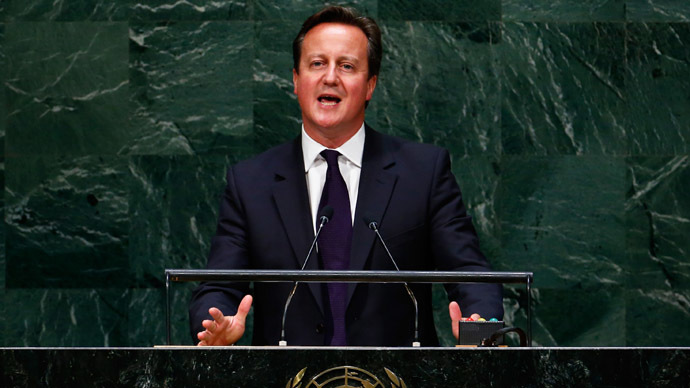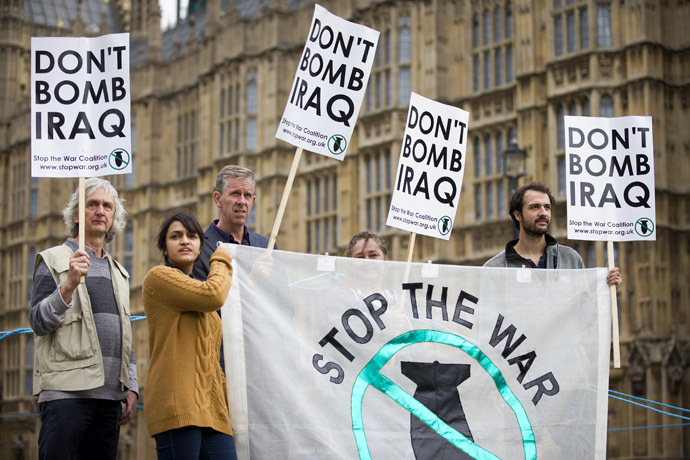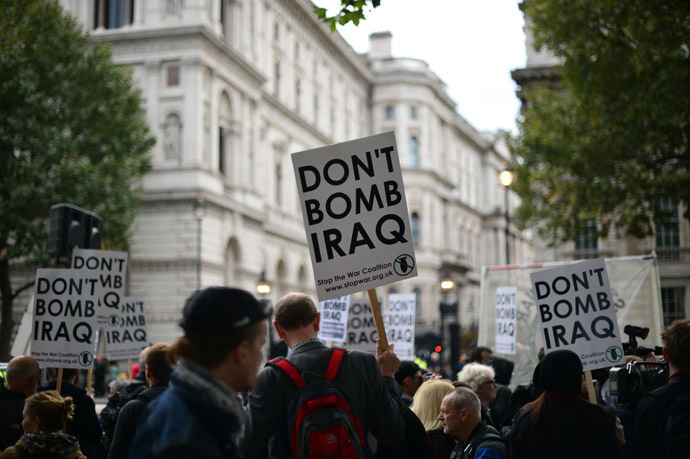David Cameron: ‘Non-Violence’ responsible for ISIS

As military action against ISIS continues, British Prime Minister David Cameron tells the UN General Assembly that “non-violent extremism” is responsible for the group’s existence.
Tale of two speeches
Last week world leaders gathered for the UN General Assembly’s 69th annual session in New York. For many participants the session is a marathon event in which Prime Minister after President mounts the podium to deliver hour upon hour of monotonous pontification. Such is the unbearable ennui of dozens of formal speeches that not only does the general public just do the highlights, most of the delegates do, too. Thus, while Barack Obama delivered a vague sermon to a packed room, British Prime Minister David Cameron’s own missive to the world was considerably less well-attended. And that’s a pity, because it was a lot more interesting.
Both speeches had similarities: Russia is evil, Iran is evil, Assad is evil, Iraq will somehow defend itself against ISIS, but the most interesting was the focus on “extremist ideology,” and “the corruption of young minds.” While Obama concentrated on the need to prevent “violent extremism,” Cameron, delivering his message to the world under considerably less scrutiny, decided to attack what he termed “non-violent extremists.”
You may, like me, at this point begin to wonder what “non-violent extremists” are. Are they like Mahatma Gandhi, who, while rejecting any notion of violence, clothed himself in a strip of homespun, subsisted on raw fruit and vegetables and was capable of starving himself near to death to make political points? Many people would admit that this is fairly extreme, but definitely non-violent. Is Julian Assange, the transparency activist, who believes that government information should be public knowledge, a non-violent extremist? What about religious groups like Jains, who don facecloths to prevent themselves speaking violence, or Jehovah’s Witnesses who refuse to go to war, but also ban life-saving blood transfusions as a mandate of their faith? Were Abolitionists and Quakers at one point non-violent extremists for their belief in human equality? Or medieval scientists willing to be burned at the stake rather than retract their theories?
Cameron, unsurprisingly, did not mention Jains or Jehovah’s Witnesses in his speech. He focused instead on ISIS, a rather interesting turn of events, since whatever else one may think of ISIS, I’m fairly certain we can all agree that the organization has gone to some lengths to ensure that no one associates their name with the term “non-violence.”

The British Prime Minister was, however, intent on drawing the connection between general disgruntlement and beheading journalists. After all, no one who is perfectly happy with the status quo would separate anyone’s head from their shoulders in the service of a political cause, right? In Cameron’s logic, where people complain too much, it could encourage others to take vigilantism into their own hands: ergo, there should be less complaining. And Cameron was very specific about the kind of complaining that should henceforth be a no-go. According to the Prime Minister:
“As evidence emerges about the backgrounds of those convicted of terrorist offences it is clear that many of them were initially influenced by preachers who claimed not to encourage violence, but whose world-view can be used as a justification for it. We know this world-view. The peddling of lies: That 9/11 was somehow a Jewish plot, or that the 7/7 London attacks were staged; the idea that Muslims are persecuted all over the world as a deliberate act of Western policy; the concept of an inevitable ‘clash of civilizations.’ We must be clear: to defeat the ideology of extremism, we need to deal with all forms of extremism, not just violent extremism. For governments, there are some obvious ways we can do this. We must ban preachers of hate from coming to our countries, we must proscribe organizations that incite terrorism against people at home and abroad, we must work together to take down illegal online material like the recent videos of ISIL murdering hostages, and we must stop the so-called non-violent extremists from inciting hatred and intolerance in our schools, our universities and, yes, even our prisons.”
Cameron’s speech could easily give a few misimpressions that I feel beholden to correct: a) “The Clash of Civilizations” is a book that was written by Harvard and Columbia academic Samuel P. Huntington, and not, as one could get the erroneous impression from Cameron’s speech, something dreamed up by imams and b), terrorist organizations are already proscribed. With official lists and everything. Membership in such organizations is by itself a punishable offence. In fact, any sort of aiding, abetting, encouraging, inciting or conspiring to commit violence, is already punishable under law. Just ask Jamie Counsel who set up a Facebook page to plan riots in Swansea (total likes: 70, total riots: apparently 0) or Karolina M. who allegedly supplied her husband, an ISIS member, with money and video cameras. There is no loophole of the law that somehow allows people to associate themselves with violent movements in any meaningful way at all without being punished for it.
The alleged radicalization of British universities
However, Cameron’s complaint about incitement and hatred at universities gave me pause; especially since he went on to argue: “Would we sit back and allow right-wing extremists, Nazis or Ku Klux Klansmen to recruit on our university campuses?”
Had I missed something? Were students recruiting for ISIS in between the Student Affairs Council and the Sports Association? I quickly googled “radical Islam British universities” to discover many a newspaper article deploring the rampant growth of pro-violence Islam on British campuses. At the forefront of this indignation the name of one organization surfaced again and again: The Centre for Social Cohesion.
The plot thickened.
I decided to take 10 seconds out of my day to look up the Centre for Social Cohesion on Powerbase and here is what I found: The Centre for Social Cohesion is a conservative think tank (its original director Douglas Murray wrote a book entitled “Neo-conservatism – Why We Need It” just in case there was any doubt about his preferences). The Centre apparently believes that “extreme” Islam is the source of all societal disaffection in Britain. It commissions studies to support this view and then broadcasts them via sympathetic media without adequate contextualization.
Perhaps the most significant “study and the one that I had seen relentlessly cited in media articles on the subject, was, “Islam on Campus: A Survey of UK Student Opinion.” It claimed to have found that a third of all Muslim students believed that killing in the name of religion was justified. However, the survey was only conducted at the few universities that had active Islamic societies, a move which was bound to skew statistics, and even there only 4 percent of Muslim respondents stated that it could be justifiable (not automatically justified) to kill in the service of preserving or promoting a religion, while a further 28 percent stated that killing could only be justifiable if the religion was under attack. The majority of Muslim respondents (53 percent) stated that killing in the name of religion could never be justified.

Not deterred by this apparent indication that Muslims are not any more bloodthirsty than anyone else, the Centre followed up with “Radical Islam on UK Campuses: A Comprehensive List of Extremist Speakers at UK Universities” which deplored “the astonishing carelessness and indifference still shown by University bodies towards the threat of radical Islam.” The existence of this threat was based on the premise that if one or two of the hundreds of thousands of students who attend British universities every year ever become terrorists, labeling universities a hotbed of terrorism is justified. Perusing “Radical Islam on UK Campuses” reveals that the alleged extremism that is being preached by the occasional university speaker does indeed include vague allusions to be willing to die for religion, but also any support at all for the Palestinian cause as well as an unwillingness to speak forcefully on issues like marital rape, which was, until very recently – as in, within my lifetime – also perfectly legal in Western society.
The report, in other words, tries to equate religiously-motivated violence with religion (but only one religion – Islam) and politically-motivated violence with holding political views, exactly as Cameron did in his speech to the General Assembly.
Was the British Prime Minister drawing on the Centre for Social Cohesion’s “studies” in doing so? Possibly. For one thing the Centre seems to be the sole proponent of this odd theory that Person A’s annoyance can directly cause Person B’s violence, not to mention the sole source of information on the alleged “Islamic extremism” of British universities, twice referred to by Cameron in his speech. As the Centre’s own report made clear, the people who actually work at those universities remain unconvinced of the existence of this phenomenon.
Despite the Centre’s clear bias, far from being abandoned, it has since merged with the Henry Jackson Society, which continues the Centre’s fine tradition of assessing the social issues of the day with well-considered pieces like, “Who cares if bombing Syria is illegal?” The Society’s international patrons include the usual suspects: Richard Perle, Bill Kristol, and James Woolsey (former CIA Director). So not only do the Centre for Social Cohesion’s politically biased views live on in the Henry Jackson Society, according to Powerbase, David Cameron has used the Centre’s studies in previous speeches to make accusations which his party later had to withdraw.
It would seem, therefore, no great leap to speculate that Cameron’s UN speech exhorting action on “non-violent extremism” may have taken its cue from the likes of the Centre for Social Cohesion and the Henry Jackson Society.
It is cause for deep worry for everyone, because it means that governments have begun to float the idea that not only are they the sole legitimate source of violence, but that they are also the sole legitimate purveyors of truth. “Even a thought can kill,” seems to be the message, “so we need to watch what you think.”
It is probably no accident that this message was thrown out in Cameron’s ill-attended speech instead of in Obama’s headline-grabber. It is unlikely that the idea of thought-crime would go down too well were it subject to public debate, especially a debate informed about the spurious origin of the claims linking violence and non-violence. Instead, the idea is creeping through in the fine print, but the lack of fanfare does not make the danger to free speech and intellectual inquiry any less real.
The statements, views and opinions expressed in this column are solely those of the author and do not necessarily represent those of RT.
The statements, views and opinions expressed in this column are solely those of the author and do not necessarily represent those of RT.













